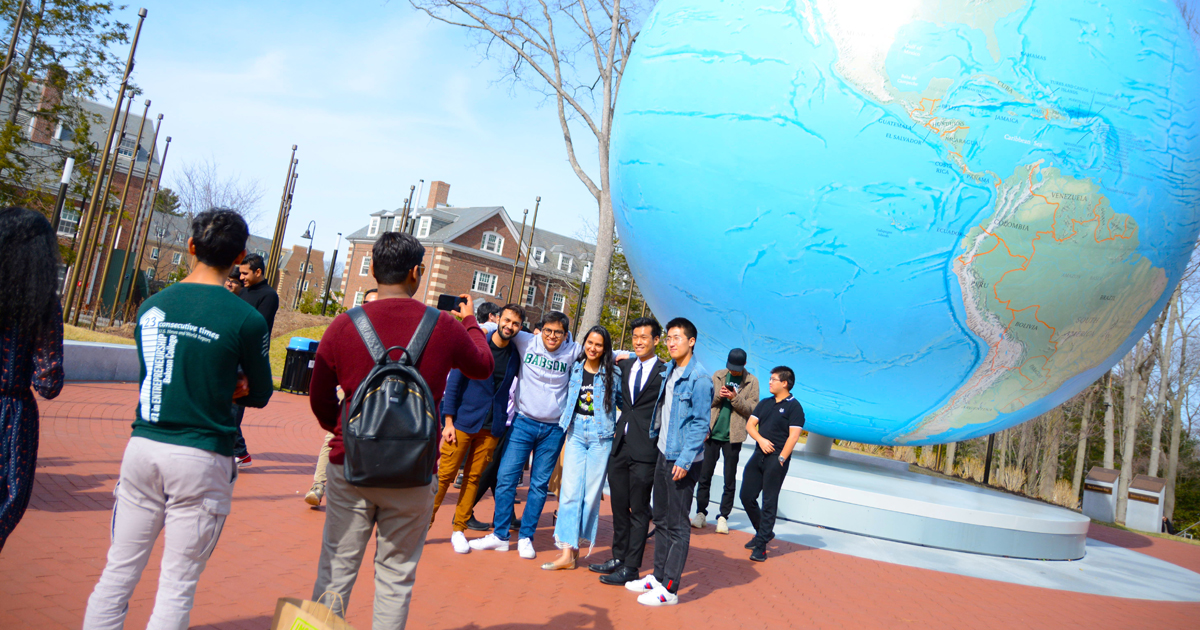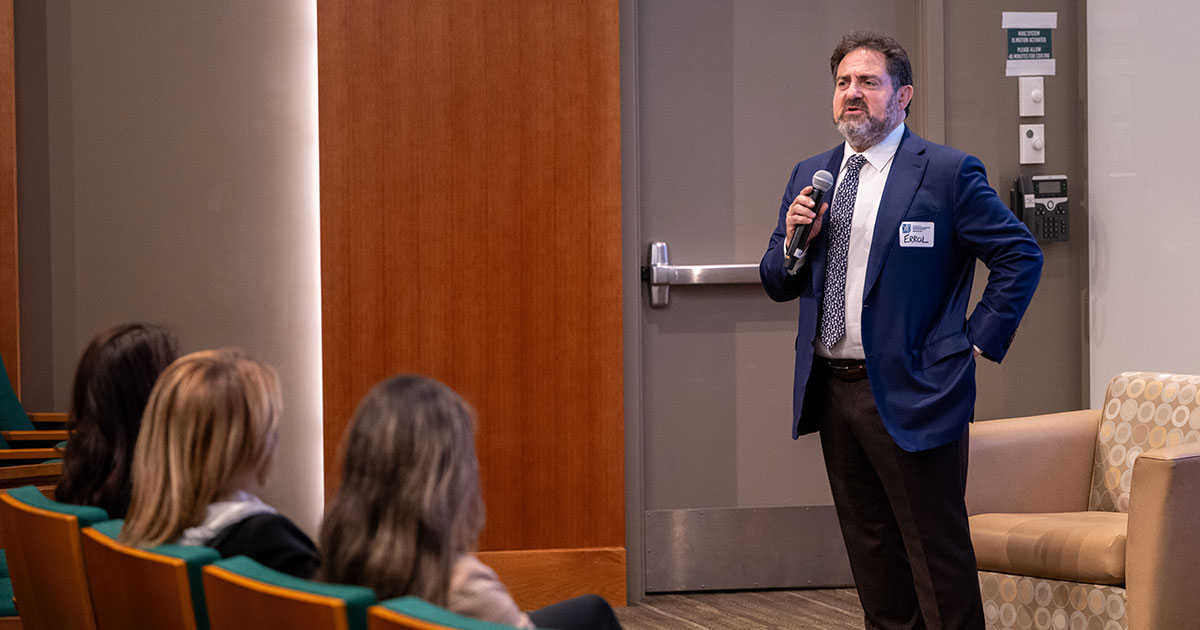Babson and Beyond: Saying Goodbye, but Pulling Together

When the pandemic forced Babson to shift courses online for the rest of the spring semester, shock soon gave way to action. As students began to pack up belongings and move off campus just before spring break, groups congregated at the Babson World Globe to pose for photos and say temporary goodbyes to friends and classmates. Action also swept across the campus, as students, faculty, staff, and alumni mobilized to complete an impressive transformation, ensuring that everyone would stay united and proving how powerful the Babson community is when it comes together.
For more coverage on how the community responded to the crisis, see Virtual Reality: How the Babson Community United in the Face of Crisis »
For the latest updates on the College’s response to 2019 Novel Coronavirus (COVID-19), visit: babson.edu/coronavirus »
Arthur M. Blank School for Entrepreneurial Leadership: Expanding the Babson Brand
Babson College has been synonymous with entrepreneurship for the better part of three decades. Now, thanks to Arthur M. Blank ’63, H’98, the Babson brand is positioning itself to own entrepreneurial leadership as well.

Arthur M. Blank ’63, H’98. Photo: Melissa Golden
The key to that strategic expansion is the Arthur M. Blank School for Entrepreneurial Leadership (AMBSEL), which was announced last November as part of a groundbreaking $50 million gift to his alma mater—the largest gift ever granted by The Arthur M. Blank Family Foundation and the largest single gift ever received by Babson.
Now, in the midst of the coronavirus pandemic that has impacted the College in unprecedented ways (see Virtual Reality: How the Babson Community United in the Face of Crisis), the need for entrepreneurial leadership has never been greater.
“We believe this expansion of entrepreneurship will create more opportunities across the broad population,” said President Stephen Spinelli Jr. MBA’92, PhD. “It centers the story on the human condition.
It is about putting people at the center of the learning process. “With this one initiative, thanks to Mr. Blank’s wonderful gift, we are revolutionizing entrepreneurship education, we are changing business education, and we even are influencing higher education.”
In a major step in April, Babson announced the launch of a national search for the Arthur M. Blank Endowed Chair for Values-Based Leadership. The search committee—led by Dean of Faculty Ken Matsuno and including seven senior faculty members—will be looking for a candidate who has demonstrated success crossing disciplinary boundaries and engaging people across cultures. The earliest appointment date is August 15.
“We are revolutionizing entrepreneurship education, we are changing business education, and we even are influencing higher education.”
President Stephen Spinelli Jr. MBA’92, PhD
AMBSEL will include a funded leadership position, a new executive doctorate program, transdisciplinary curriculum, and new research and case writing curated via a new portal. It also will create the Blank Global Challenge to drive thought and action to address the Global Goals of the United Nations.
The center of Babson’s expanding entrepreneurial ecosystem will be the new Entrepreneurial Leadership Village. The idea is to model the village on the existing eTower, which is home to 21 high-achieving student entrepreneurs. The goal is for the new village to build and scale a similarly integrated community—one that could even be replicated beyond Babson’s Wellesley campus.
“If it’s a collaborative model, it can then be replicated and it can influence Babson’s idea of entrepreneurial leaders in a more robust way,” Spinelli said. “It’s a huge opportunity.”
Editor’s note: Babson Magazine had planned extensive coverage of the Arthur M. Blank School for Entrepreneurial Leadership, including what it means for the College and the future of entrepreneurial leadership, in this issue, but we’ve pivoted in these extraordinary circumstances. We will be revisiting coverage of Arthur Blank and AMBSEL in an upcoming issue this year.
‘Real-time Market Test’ of College’s Strategic Plan
Babson College’s strategic planning process now has been a year in the making, involving hundreds of stakeholders and participants and thousands of community inputs, and helping to chart the College’s future in its second century.
“There is disruption in the marketplace that, for a lot of people, is scary,” Spinelli said. “But, Babson is a different and special place. We were built for this time. We were unique for our first 100 years, and we will be even more important for the next 100.”
Spinelli spoke in front of the campuswide community meeting March 5, less than a week before an entirely new disruption—the coronavirus pandemic—forced Babson to take dramatic action, moving all of its classes online and closing its campus to students, faculty, and staff.
The pandemic, though, has not paused nor slowed the planning process. Instead, the strategic plan—including five strategic initiatives that emerged from the Board of Trustees meeting in February—helped inform necessary decisions and actions.
“This crisis has proven to be a real-time market test of the strategy,” Spinelli said in early April. “The current global health crisis validates what we have identified as our strengths, specifically our initiatives around delivering education where and when learners demand it, radically recreating our organization, and expanding our focus to include entrepreneurial leadership.
“Now is the time to accelerate implementation for the greatest impact on Babson’s future.”
The crisis already has revealed the need for accelerated implementation of the five strategic initiatives:
- Own Entrepreneurial Leadership, establishing the Arthur M. Blank School for Entrepreneurial Leadership—with the $50 million gift from The Arthur M. Blank Family Foundation—to produce empathetic entrepreneurs capable of creating solutions to benefit communities and the world.
- Deliver Education Where And When Learners Demand It, which suddenly became both essential for the current moment and critical for continued innovation to ensure long-term success.
- Develop Additional Education Models, so that every Babson learner gains and employs skills to solve the real-world problems of business, government, and society.
- Bolster Entrepreneurial Activity In Key Regions And Sectors, convening and/or engaging in ecosystems to transform entrepreneurial systems and conditions.
- Radically Recreate The Organization, driving a culture of trust, collaboration, and inclusive excellence, exemplified in the ways the College mobilized during the crisis.
The crisis already has revealed the need for accelerated implementation of the five strategic initiatives: “We are better positioned than virtually any college or university in the country,” Spinelli said at the community forum in early March.
“What we’re doing is important. The changes are rapid, but the opportunity is substantial.”
And, that was before the world changed, and the College’s five strategic initiatives became even more relevant and more important.
For more details on Babson’s strategic plan, visit: babson.edu/strategicplan »
More News in Babson and Beyond
- A New Institute Takes a Broader View of Entrepreneurship »
- Entrepreneurs Worldwide Want Their Business to Make a Difference »
- Babson Entrepreneurs Win B.E.T.A. Challenge »
- Ring Founder and Babson Alumnus Named AACSB Influential Leader »
- Building a BASE of Future Entrepreneurs »
- How Babson Dining Could Help Save New England’s Dairy Farms »
Posted in Community



